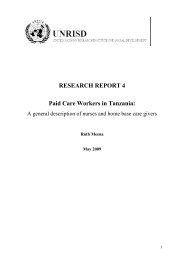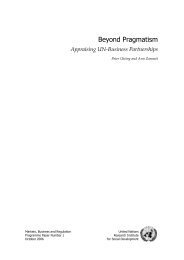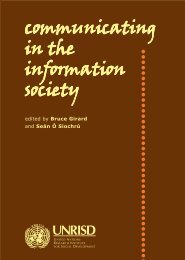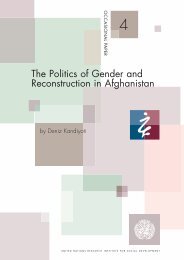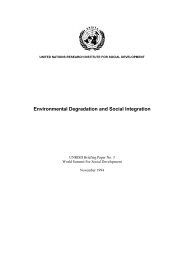Women's Employment - United Nations Research Institute for Social ...
Women's Employment - United Nations Research Institute for Social ...
Women's Employment - United Nations Research Institute for Social ...
Create successful ePaper yourself
Turn your PDF publications into a flip-book with our unique Google optimized e-Paper software.
Trade unions, gender issues and the ready-made garment industry of Bangladesh<br />
membership of 30 per cent of the total number of workers employed<br />
in the establishment or group of establishments in which it is <strong>for</strong>med.<br />
The Industrial Relations Ordinance of 1969 also stipulates that nonworker<br />
trade unionists cannot become members or office bearers of<br />
any trade union unless it is a federation of trade unions.<br />
After an application on behalf of a federation or union is<br />
submitted, if the Registrar of Trade Unions is convinced that the<br />
federation or union has complied with all the requirements of the<br />
Industrial Relations Ordinance of 1969, including the minimum<br />
membership of 30 per cent, he/she will issue the Registration<br />
Certificate. Be<strong>for</strong>e issuing the Registration Certificate, the inspectors<br />
of the office of the Registrar of Trade Unions will normally try to<br />
verify all factual evidence by going to the garment factories. There<br />
are allegations that it is at this stage that the owners try to sabotage<br />
the whole process of unionization. The Registrar of Trade Unions did<br />
not rule out the possibility that some garment factory owners might<br />
try to bribe the inspectors so that they do not write positive reports<br />
regarding the federations’ and/or unions’ fulfilling all their<br />
requirements <strong>for</strong> obtaining Registration Certificates; however, he<br />
claimed that his office always tries to cross-check those reports through<br />
other factual evidence be<strong>for</strong>e deciding whether or not to issue any<br />
such Certificate.<br />
The controversy, however, does not end there. The Industrial<br />
Relations Ordinance of 1969 also stipulates that the registration of<br />
any trade union can be cancelled by the Registrar of Trade Unions<br />
after obtaining permission from the Labour Court if, among other<br />
things, the membership of that trade union falls short of 30 per cent<br />
of the workers of the establishment or group of establishments <strong>for</strong><br />
which the union was <strong>for</strong>med. Now, there are also allegations that the<br />
owners always try to keep the inspectors in “good humor” so that<br />
they always look <strong>for</strong> excuses to prove that the membership has fallen<br />
short of the required 30 per cent. When the author raised this issue<br />
with the Registrar of Trade Unions he did admit the possibility that<br />
his office may not be in a position to monitor the activities of the<br />
trade unions all the time. But he added that if there is a dispute<br />
regarding the current legal status of a federation or unit union, his<br />
office attempts to resolve the dispute in accordance with the law and<br />
to the satisfaction of the parties concerned. If, however, the ef<strong>for</strong>ts of<br />
his office prove to be futile in resolving union-management disputes,<br />
the Directorate of Labour issues a certificate to that effect, and then<br />
the concerned parties are free to seek remedies through other legal<br />
and judicial procedures.<br />
211




